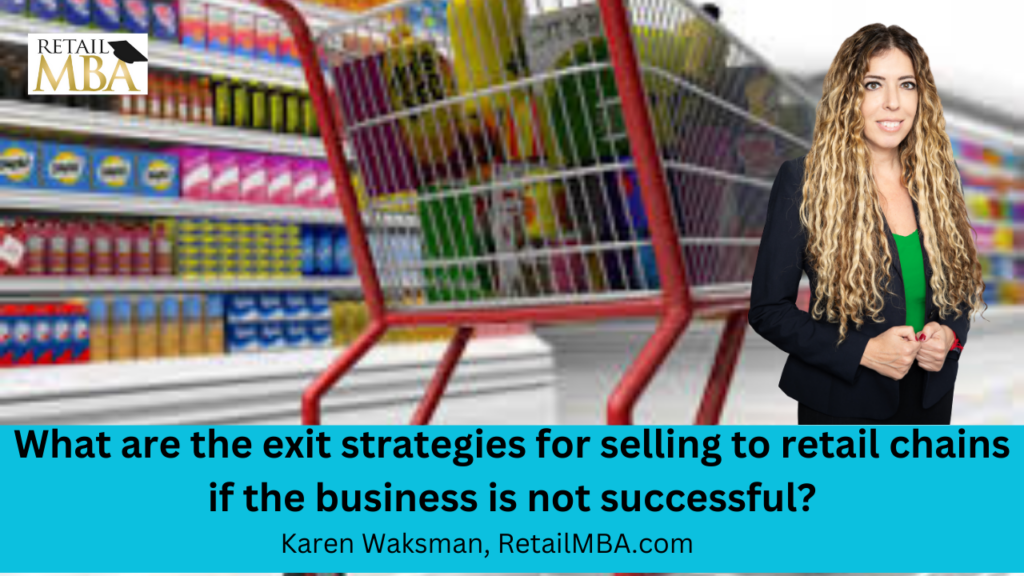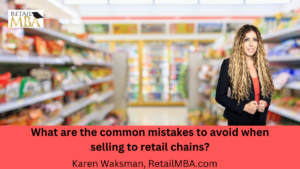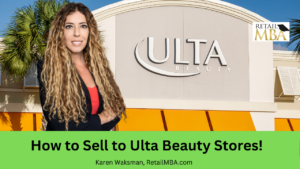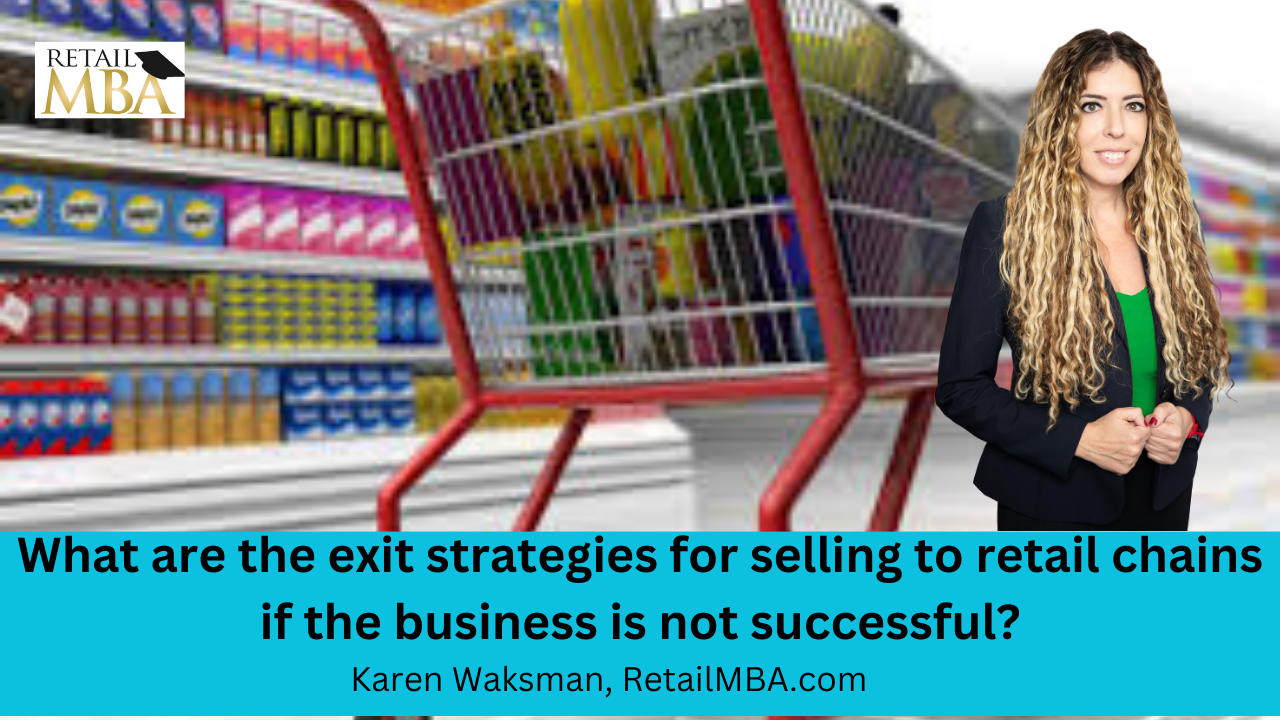Retail Strategy Examples
Retail Strategy Examples – What are the exit strategies for selling to retail chains if the business is not successful?
In this short video training, we will discuss the exit strategies for selling to retail chains if the business is not successful. It is important to have a backup plan in place before launching into selling to retail chains. Karen Waksman explains that one of the key steps is to consider what will happen if the products do not sell and the retailer wants to return them.
Importance of a Backup Plan
When working with retail chains, it is crucial to have a backup plan in case the products do not sell. Some retailers may be willing to eat the cost with you if the products do not sell, while others may require you to take the products back. Before entering into a deal with a retailer, it is important to review the contract and understand the terms regarding returns.
Avoiding Bankruptcy and Protecting Your Business
Many people make the mistake of hoping for the best and not considering the potential consequences if the products do not sell. However, it is essential to think about what you can do with the products if they do not convert in retail chains. This is to ensure that you do not go bankrupt or harm your business in any way. Instead of just hoping for the best, it is important to be proactive and come up with an exit strategy.
Exploring Other Ways to Sell the Product
If the products do not sell in retail chains, there are other avenues you can explore to generate revenue. One option is to sell the products online, on platforms such as Amazon or other e-commerce websites. This allows you to reach a wider audience and potentially find customers who are interested in your products.
Working with a Rep or Offpricing the Product
Another option is to work with a sales representative who can help you sell the products to other retailers or offprice them. Offpricing refers to selling the products at a discounted price to clear inventory. This can help you recoup some of the costs and avoid being stuck with unsold products.
Selling to HSN, QVC, or Local Retailers
You can also explore selling the products to other channels such as HSN or QVC, which are home shopping networks. Additionally, consider reaching out to small local retailers in your area who may be interested in carrying your products. These alternative channels can help you find new customers and generate revenue.
Exploring Different Money-Making Strategies
It is important to remember that retail chains are not the only way to make money with consumer products. There are various other strategies you can explore, such as selling through catalogs or utilizing group buying platforms like Groupon. By diversifying your revenue streams, you can protect your business and increase your chances of success.
Learning and Making Compelling Business Choices
To ensure that you are prepared for any situation, it is crucial to educate yourself on different money-making strategies and backup plans. Retail MBA offers a variety of programs and webinar trainings that cover various ways to make money with consumer products. These resources can help you learn about selling to retail chains, as well as other avenues for generating revenue. It is important to make compelling business choices based on your strengths and resources. For example, if you are skilled at selling products online, you may choose to focus on that channel. However, if you are not confident in your online selling abilities, it is important to explore other options and develop backup strategies.
What are the exit strategies for selling to retail chains if the business is not successful?
Selling to retail chains can be a challenging endeavor, and it is important to have a backup plan in case the products do not sell. By considering alternative avenues for selling your products and diversifying your revenue streams, you can protect your business and increase your chances of success. Retail MBA offers a range of resources and training programs to help you navigate the world of retail chains and develop effective strategies for selling your products. Remember, being a successful business person means thinking ahead and being prepared for any situation that may arise.
To learn more about approaching, pitching, and selling to retailers, as well as developing backup strategies, check out Retail MBA’s core training system called “Retail MBA.” They offer live events, done-for-you services, and do-it-yourself programs to support your journey in the retail industry.
Remember, having a backup plan is essential for the success of your business. Don’t underestimate the value of your products and the hard work you have put into creating them. By being proactive and considering all possible avenues for selling your products, you can ensure the long-term success of your business.

Crafting a Robust Exit Strategy for Unsuccessful Retail Chains – Transcript for Video Here!
The world of retail chains is a dynamic and challenging space, where success is not guaranteed. In this discussion, Karen Waksman sheds light on the crucial topic of exit strategies for businesses dealing with retail chains that might not be yielding the expected results. With her insights from the Retail MBA framework, Waksman emphasizes the need for a well-thought-out backup plan to mitigate potential risks and losses.
The Importance of a Backup Plan
Before diving into retail chains, Waksman recommends entrepreneurs develop a comprehensive backup plan. This plan serves as a safety net in case the products do not perform as expected in the market. She highlights a common scenario where retailers may return unsold products, potentially causing financial strain on the business. To address this, Waxman urges business owners to consider alternatives to recoup their investments and avoid detrimental consequences.
Contracts and Communication
Waxman stresses the importance of understanding the terms and conditions set forth by retailers. Some contracts explicitly mention the possibility of returning unsold products, and it is essential for entrepreneurs to be aware of such clauses before finalizing deals. Being well-informed allows for better decision-making and minimizes the risk of financial setbacks.
Crafting Your Exit Strategy
The crux of Waksman’s advice lies in proactively thinking about exit strategies before even entering into agreements with retail chains. She encourages entrepreneurs to ask themselves what they would do if their products fail to convert. This forward-thinking approach is designed to protect businesses from potential bankruptcy and other adverse effects.
Diversification of Sales Avenues
Rather than relying solely on retail chains, Waksman advocates for diversification in sales channels. Entrepreneurs are encouraged to explore various alternatives, such as selling online on platforms like Amazon, engaging with off-price retailers, or even tapping into local markets. This multifaceted approach ensures that if one avenue falters, there are other viable options to fall back on.
Collaborative Strategies
Waksman introduces the concept of collaborating with representatives who can offload unsold products or exploring partnerships with outlets like HSN and QVC. These collaborations can provide alternative routes to selling products, reducing the impact of a failed retail chain venture.
Learning and Adapting
The retail landscape is ever-evolving, and success often hinges on an entrepreneur’s ability to adapt. Waksman encourages business owners to continually educate themselves on various money-making strategies, including selling catalogs, participating in group deals, and exploring new ways to market products.
The Retail MBA Approach
Karen Waksman’s Retail MBA offers a comprehensive training system that covers every aspect of approaching, pitching, and selling to retailers. This includes valuable insights on what to do if products do not sell as anticipated. The program encompasses live events, do-it-yourself programs, and done-for-you services, providing entrepreneurs with a toolkit to navigate the complexities of the retail industry successfully.
Conclusion
Navigating the world of retail chains requires more than just a great product; it demands strategic foresight and contingency planning. Karen Waksman’s advice on crafting a robust exit strategy emphasizes the need for entrepreneurs to be proactive and well-prepared for any challenges that may arise. By diversifying sales avenues, collaborating with industry partners, and continually learning, businesses can not only weather the storms of an unsuccessful retail chain venture but also thrive in the ever-changing retail landscape
Here a are a few blogs that may interest you!
1. Product Distributors – How to Work with Distributors!
Step-by-step training on how to sell to retail chains!
We explain exactly how to do that and how to get started today. I’ve taught over 100,000 of companies over the years across the globe on how to get your products to the stores. And so we’re here to support you. Or please subscribe to our Youtube channel and or be on the lookout for additional training that we create.
We are here to expedite the process of generating revenue with your physical products and that’s what we’re all about. Take a look at our advanced training, live events, certification programs and so much more.
In this training, I will discuss some of the things to think about when approaching a retailer to sell your products and become a vendor. Hope it helps! 🙂
Karen Waksman,
Retail MBA
Questions? Contact Us!
1-855-Retail-2 (Call or Text)
Email: info@retailmba.com
Retail MBA provides a step-by-step formula on How to Sell to Major Retailers, Online Retailers, Smaller Retailers, Catalogs and More. No Experience Required! These solutions continue to convert for clients year-over-year! These are Time-Tested and Proven Strategies that we utilize ourselves when going after stores! Everything we teach, we test. Want access to these formulas? ANY one of our programs and coaching systems gives you access to them now. With that said…
Here are 5 Easy Ways to Work with Us:
1) Free Training – If You Would Like to Join Our Next FREE Webinar Training Called “Retail Chain Store Secrets – How to Sell to Major Retail Chains. No Experience Required” Then Sign Up NOW To Learn All About Selling into Retail Chains By Clicking Here!
2) Retail MBA Year Long Coaching and Training System – Our Year Long Coaching and Training System with Karen Waksman is POWERFUL! This is our most popular training and coaching system! We walk you through how to approach, pitch and sell to retail chains and we coach you along the way! Join us by Clicking Here!
3) Masterclass Intensives – Want to Join our Next 4 Week Elite Retail MBA Masterclass Intensive? These Intensives Are EPIC for people who Love Fast Paced Learning – Homework, Retail Coaching, Developing Your Strategy, Buyers Contacts and More! These Events Are Held Every Quarter. Join us by Clicking Here!
4) Done-for-You Program – If You Want Karen Waksman and Her Team to Reach Out to Your Top Dream Retail Chains On Your Behalf – And You Have a Retail-Ready Product, Check Out our Epic Done-For-You Service by Clicking Here!
5) In Person Events – If You Want to Learn LIVE and Meet Karen Waksman in Person at Our Next “America’s Next Retail Product: LIVE Event with Other Like-Minded Individuals in Beautiful San Diego, CA! We Would LOVE to Have You Join Us by Clicking Here!
Check Out Our Additional Blog Posts Here:

Retail Terms
Retail Terms – What are the payment terms typically offered by retail chains? Click Here to Learn More!

Retail Vendor
Retail Vendor – What are the common mistakes to avoid when selling to retail chains? Click Here to Learn More!

How to Sell Your Holiday Products to Retail Chains
New Training on How to Sell Your Holiday Products to Retail Chains


Ulta Beauty Vendor
Ulta Beauty Vendor – How to Sell to Ulta Beauty Stores. Click Here to Learn More!

Retail Strategy
Retail Strategy – How do I handle negotiations with retail chains? Click Here to Learn More!


